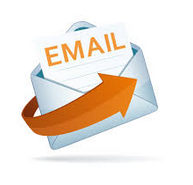The Email Protocols
 When you have three different teaching jobs, run a website, and blog for two more, you end up spending a lot of time on email. This is what I have learned over the past few months as I’ve juggled a variety of burgeoning professional obligations, all of which require a significant amount of regular email communication. Sometime in the midst of the many hours I’ve spent typing away on my iPad, it struck me that the ability to write a professional email is indispensable for the millennial musician, given the medium’s status as a primary means of communication–but failure to adhere to the “email protocols” could very well have a negative impact on one’s professional prospects. So, I thought it might be beneficial to devote this week’s post to a discussion of how (or more importantly, how not) to write a professional email.
When you have three different teaching jobs, run a website, and blog for two more, you end up spending a lot of time on email. This is what I have learned over the past few months as I’ve juggled a variety of burgeoning professional obligations, all of which require a significant amount of regular email communication. Sometime in the midst of the many hours I’ve spent typing away on my iPad, it struck me that the ability to write a professional email is indispensable for the millennial musician, given the medium’s status as a primary means of communication–but failure to adhere to the “email protocols” could very well have a negative impact on one’s professional prospects. So, I thought it might be beneficial to devote this week’s post to a discussion of how (or more importantly, how not) to write a professional email.
1. Keep to the “business-letter” format.
Your name, address, and the date are provided for you, of course, but everything else should be there, too: a proper opening salutation, body paragraphs (with spaces between them), and a closing salutation and signature. The salutations in particular are very important–always use “dear” or simply write the person’s name when reaching out to someone you haven’t met, whereas a more friendly, less formal “hi” might be more appropriate for an acquaintance of colleague. “Hey” should only be employed with someone whom you have a strong relationship with–you wouldn’t open a cover letter with “Hey Dr. So-and-So!”, so you shouldn’t do the same when emailing him. Your sign-off is very important too–“Best” is usually a good bet (or “Best wishes”), or “Thanks” (if appropriate to the content of the message). Fancier adverbs like “sincerely” or “cordially” should be reserved for more formal or first-time correspondence.
2. Write Right.
Business-letter standards of writing should apply as well. Yes, it’s easy to succumb to temptation and respond as soon as a message pops up on your phone, but your addressee will likely not be appeased by the abbreviations, typos, or at worst, auto-correct fails that might ensue as a result of your eagerness. If your thumb is too tired to type it all out, save it for the laptop! Your addressee can wait.
Which brings me to point number 3…
3. Don’t expect immediate responses.
One time in undergrad, I was attempting to secure an accompanist for my jury. I emailed two prospects in the morning and went off to practice. When I checked my email next, around lunchtime, I was surprised to discover no less than three (3) emails from one of them, the first of which confirmed his ability, the second of which informed me that he had run through all of my repertoire that morning and had deemed himself able to play it, and the third of which, sent not half an hour later, inquired rather officiously as to whether I had found someone already, seeing as I hadn’t replied. To make matters more complicated, that morning my teacher had informed me that this particular pianist would probably not be the best choice, and that I should really try to get the other guy I had emailed….who, of course, hadn’t written back yet. Hmm….
This anecdote may seem comical, but I can assure you that it’s never very fun when you’re dealing with a compulsive emailer, especially in the age of iPhones and push notifications. A good rule of thumb is this: unless it’s a timely matter (i.e. “I’m on my way to my lesson and got lost please help”), give the person twenty-four hours before alighting in their inbox with a follow-up. Not everyone, even these days, has the technology (or the time) to respond right away, and besides, if you really need to reach someone, you can always call them (if, of course, you can withstand the awkwardness of *gasp* speaking to them in person!!). Even with a careful choice of words, you will inevitably come across as annoying if you send multiple emails in rapid-fire fashion. Think of it this way: sending one email is like one owl attempting to deliver a letter to Harry Potter in “Sorcerer’s Stone.” Do you really want your colleague’s inbox to look like this??
4. Respond in a timely fashion.
On the other hand, you don’t want to be “that guy” who only checks his email twice a month. These days, emails are often considered to be equivalent to voicemails, so similar standards apply. Timely and urgent messages take priority, while less important matters can wait a couple days if necessary. That said, a prompt response can actually say quite a lot about your personal dedication and devotion to whichever capacity you are responding in. For instance, you can make a positive impression on a prospective employer by promptly responding to emails about a job interview, whereas you could actually hurt your chances by letting those messages stew in your inbox for a few days.
5. Beware “Reply All”.
With the wealth of communication technology now available to us, it is easier than ever to be in touch with almost anyone–but it is also easier than ever to accidentally communicate information to the wrong party. Always, always, always double check the address bar in an email prior to sending, as well as the CC’s. It may seem like common sense, but I can recall more than one occasion in which I’ve seen an email chain turn very uncomfortable because a recipient made a unfavorable comment about an individual who was, in fact, copied on the message. Similarly, while “Reply All” can be convenient for correspondence lists of a moderate size, you should avoid it when it’s a mass mailing to, say, an entire chamber music program. I witnessed this transpire en masse back in November when the chamber music program I coach for had a recital coming up. The director sent out an email to everyone asking them to reply to her with the item they would bring for the post-recital reception, but one parent neglected to read the fine print and hit “reply all” to let everyone know she would be supplying the cheese and crackers. As a result, everyone else thought they should hit reply all, too, so I opened my email that night to see about 40 unread messages, all of which had to do with food (which was not annoying so much as a source of insatiable cravings for cheese, cookies, and other delectable goodies).
In the end, of course, all it really takes is good common sense (and perhaps a decent thesaurus) to exhibit professionalism when emailing, but it is important that one adheres to these “email protocols” regularly and effectively. When you’re besieged with concerts, practicing, and other commitments, answering email might very well be the last thing you want to do, but doing it, and doing it well, will most certainly be to your benefit, in more ways than one.


